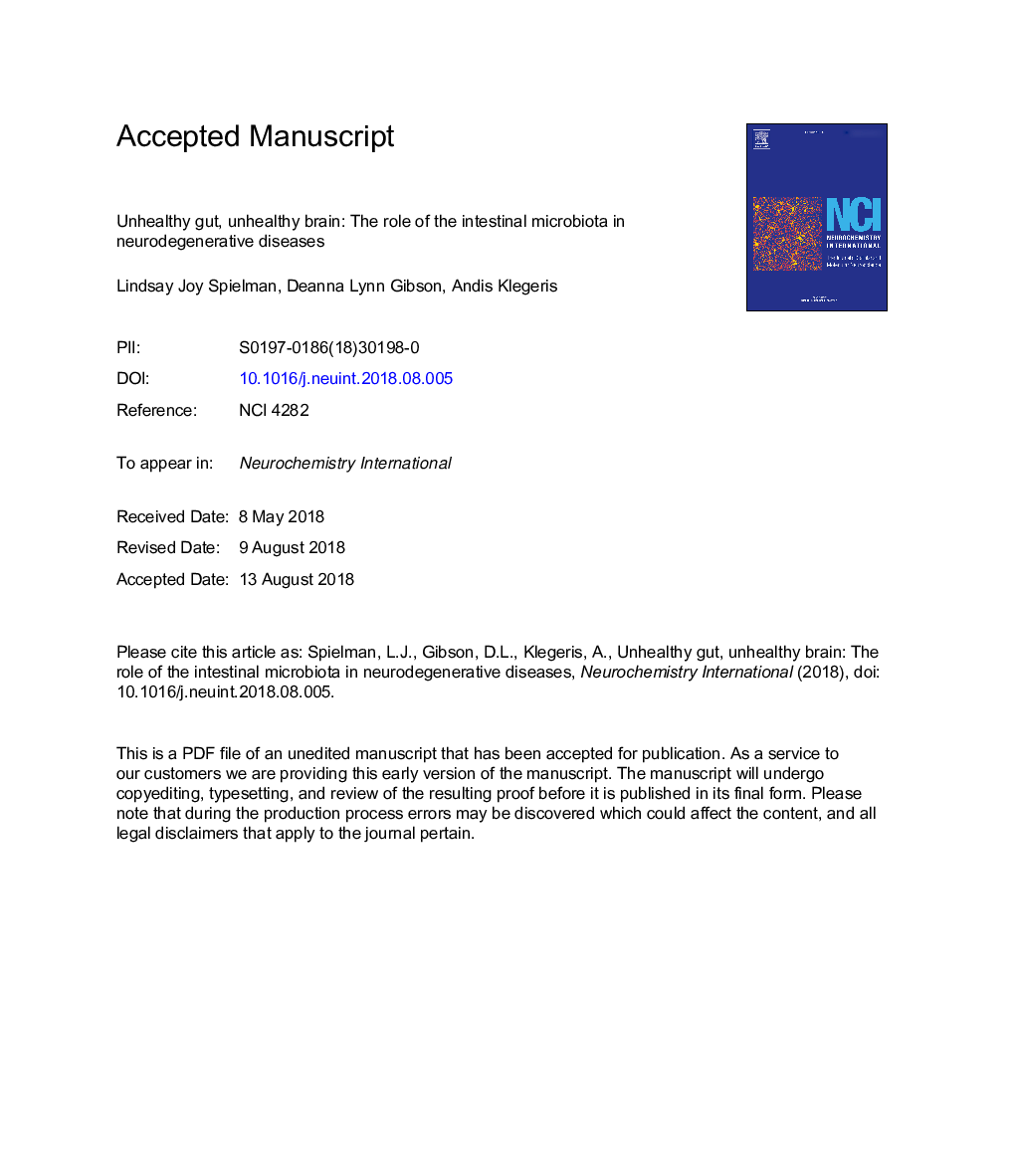| کد مقاله | کد نشریه | سال انتشار | مقاله انگلیسی | نسخه تمام متن |
|---|---|---|---|---|
| 9954522 | 1551256 | 2018 | 62 صفحه PDF | دانلود رایگان |
عنوان انگلیسی مقاله ISI
Unhealthy gut, unhealthy brain: The role of the intestinal microbiota in neurodegenerative diseases
ترجمه فارسی عنوان
روده ناسالم، مغز ناسالم: نقش میکروبیولوژیک روده در بیماری های نورودنراتیو
دانلود مقاله + سفارش ترجمه
دانلود مقاله ISI انگلیسی
رایگان برای ایرانیان
کلمات کلیدی
بیماری آلزایمر، بیماری پارکینسون، اسکلروز جانبی جانبی آمیوتروفیک، باکتری، اسیدهای چرب زنجیره کوتاه، عصب واگ،
موضوعات مرتبط
علوم زیستی و بیوفناوری
بیوشیمی، ژنتیک و زیست شناسی مولکولی
بیولوژی سلول
چکیده انگلیسی
The number of bacterial cells living within the human body is approximately equal to, or greater than, the total number of human cells. This dynamic population of microorganisms, termed the human microbiota, resides mainly within the gastrointestinal tract. It is widely accepted that highly diverse and stable microbiota promote overall human health. Colonization of the gut with maladaptive and pathogenic microbiota, a state also known as dysbiosis, is associated with a variety of peripheral diseases ranging from type 2 diabetes mellitus to cardiovascular and inflammatory bowel disease. More recently, microbial dysbiosis has been associated with a number of brain pathologies, including autism spectrum disorder, Alzheimer's disease (AD), Parkinson's disease (PD), and amyotrophic lateral sclerosis (ALS), suggesting a direct or indirect communication between intestinal bacteria and the central nervous system (CNS). In this review, we illustrate two pathways implicated in the crosstalk between gut microbiota and CNS involving 1) the vagus nerve and 2) transmission of signaling molecules through the circulatory system and across the blood-brain barrier (BBB). We summarize the available evidence of the specific changes in the intestinal microbiota, as well as microorganism-induced modifications to intestinal and BBB permeability, which have been linked to several neurodegenerative disorders including ALS, AD, and PD. Even though each of these diseases arises from unique pathogenetic mechanisms, all are characterized, at least in part, by chronic neuroinflammation. We provide an interpretation for the substantial evidence that healthy intestinal microbiota have the ability to positively regulate the neuroimmune responses in the CNS. Even though the evidence is mainly associative, it has been suggested that bacterial dysbiosis could contribute to an adverse neuroinflammatory state leading to increased risk of neurodegenerative diseases. Thus, developing strategies for regulating and maintaining healthy intestinal microbiota could be a valid approach for lowering individual risk and prevalence of neurodegenerative diseases.
ناشر
Database: Elsevier - ScienceDirect (ساینس دایرکت)
Journal: Neurochemistry International - Volume 120, November 2018, Pages 149-163
Journal: Neurochemistry International - Volume 120, November 2018, Pages 149-163
نویسندگان
Lindsay Joy Spielman, Deanna Lynn Gibson, Andis Klegeris,
